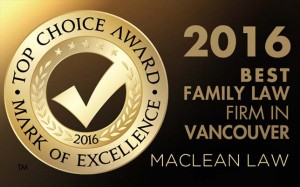Our top rated* Vancouver family property income tax lawyer team knows and ensures family property is accurately valued and divided so each party has assets of equal value unless significant fairness is proven. Our award winning Vancouver Family Property Income Tax Lawyer group also knows that all too many times self represented parties or parties hiring lawyers not familiar with crucial income tax pitfalls end up with horror stories of people receiving far less than their fair share because income tax issues were not properly considered. Contact Lorne N MacLean, QC and his team today to avoid potential disaster. You can call also us toll free to meet with us in Vancouver, Calgary, Surrey, Kelowna, Richmond and Fort St John, BC at 1-877-602-9900.
*(Top Choice Award (2014, 2016, 2017), top rated reviews on Google, Yelp, threebestrated, lawerratingz.com).

Different Types Of BC and Calgary Family Property Have Different After Tax Values
Our skilled Vancouver family property income tax lawyer team wants a potential family client who owns significant assets to know that various types of family property have different after tax values with the best assets in descending order being:
- family home being first by a wide margin being as completely tax free,
- stocks and rental properties being the next best with reduced income taxes payable as capital gains tax,
- RRSP’s hold third place as cashing them triggers normal income taxes,
- and in last place the family business that attracts both corporate disposition costs AND income taxes to get money out of the company and into the hands of the owning spouse.

Vancouver Family Property Income Tax Lawyer
Lorne N. MacLean, QC one of Canada’s most highly rated senior family lawyers handles complex family property division and high net worth family wealth preservation and asset protection daily.
*Lorne N. MacLean was selected as a QC in 2011 which is an honour reserved to recognize exceptional merit and contribution. In addition, of practising B.C. lawyers, only up to 7% overall can be awarded this designation.
A good Vancouver family property Income tax lawyer will know that in the most extreme cases a $1,000,000 home could be worth $460,000 more than a $1,000,000 business that was sold and then had all the sale proceeds paid out as income to the owner of the company.
Tax credits for shareholders loans, capital dividend accounts credits and other credits may reduce the bruising income tax hit to withdraw corporate family property into the personal hands of the owner but any business owner should pick up the phone and speak with Lorne N. MacLean, QC of the award winning firm of MacLean Family Law when faced with a claim for family property division involving any family business, venture, professional practice or partnership.
You have options to ensure the tax is fairly accounted for. Our skilled and aggressive Vancouver Family Property Income Tax Lawyer team deals with multimillion dollar family property disputes and international wealth valuation and division daily.
New Case Gives Hope For High Net Worth Clients Explains Vancouver Family Property Income Tax Lawyer
Our experieinced Vancouver family property Income tax lawyer team always watches the development of income tax credit being factored in to family property division cases in BC and Calgary as it makes a huge difference in settlements and trials of family property division cases.
In Maguire v Maguire this weeks big Bc Court of Appeal family law decision the Court looked at distributive income taxes and corporate taxes after a unique trial ruling.
Our founder, Lorne N. MacLean, QC notes that the dentist husband appealed an order valuing family property and debt and ordering a compensation payment from him to Ms. Maguire to effect an equal division of family property and family debt that did not take corporate and distributive taxes into account. Surprisingly, the judge used an income for the husband that was less than he really earned and delayed payment of the equalization payment until his dental practice sold.
Although the practice was sup for sale there was no deadline for the wife to receive her payment. So while the husband did not receive support at the highest fair level she also didn’t get any set deadline by which the husband was to pay her out for her share of his dental practice. Finally, the husband put his practice up for sale at an amount above the value used at trial so did he already get credit for taxes if it sold for more is a question for the savvy reader?
Here is what the court said:
The husband argues the trial judge erred by failing to account for corporate and distributive taxes payable on a sale of his endodontic practice and on a sale of an asset by a second corporation. He says those taxes must be accounted for in assessing fair market value, treated as family debts, or alternatively the compensation payment must be adjusted to account for them.
Held: appeal dismissed. Corporate and distributive taxes may be taken into account in the division of family assets. The judge did not err in not adjusting the compensation payment for such taxes here where the incidence of tax and timing of events triggering such taxes was fundamentally uncertain.
[7] The judge found the net value of family property to be $3,449,373. That figure includes a value of $877,000 for HMI and $1,215,719 for ELC, both of which are included in the property division as assets of the appellant. That required an equalization payment of $413,674 by the appellant to the respondent. The equalization payment is only to be paid when the appellant sells HMI, the endodontist practice.
Definition of Fair Market Value
[27] The appellant’s first argument is that any taxes payable on a sale must be accounted for in the valuation of the parties’ interests in HMI and ELC. He says that in order to correctly apply the definition of “fair market value” in s. 87, one must necessarily, i.e., as a matter of law, include the calculation of taxes payable upon a sale.
Section 86 – Family Debt
[31] The appellant’s second argument is that corporate and distributive taxes payable on the disposition of property are a “family debt” within the meaning of s. 86 of the FLA. He therefore argues the trial judge wrongly ignored family debt in the form of corporate and distributive taxes in determining the compensation or equalization payment of $413,674.
[35] As the value of family property and debt is to be divided equally unless it is significantly unfair to do so, the appellant argues that there is a high threshold to depart from that standard. He says the trial judge’s decision to not deduct for corporate and distributive taxes effects an unequal division of property, without addressing the “significant unfairness” threshold for making an unequal division.
[39] In my opinion, corporate and distributive taxes can and should be taken into account in the division of property in appropriate cases. In this case, the trial judge said that there should be no tax consequences borne by the respondent because of the uncertainties with respect to the sale of the appellant’s professional practice.
[40] There was evidence before the Court that the tax implications of the sale of HMI were speculative, that it was not possible to know whether the sale would take place by way of a share sale or an asset sale (which had different tax implications), what the purchase price might be, what length of time it would take to accommodate a sale, and what the tax implications of the sale would be. As I have said, HMI was advertised for sale at a price substantially in excess of the value determined by the valuator. The date of any sale of HMI was uncertain and ELC had substantial cash reserves.
42] In my opinion, there is merit to the respondent’s position. In this case it is by no means certain that HMI will sell or when, or how it will sell, by assets or shares, or at what amount; or what the tax consequences will be. Nor is it obvious that ELC will incur tax, depending on the appellant’s choices. There is no set date at which time the compensation payment is due, rather it is contingent on a certain event. As the trial judge said, setting the appellant’s income at the $400,000 level allows him to save and plan. I agree that in general tax consequences should be taken into account, and in some cases a sunset clause is appropriate. However, in these rather unique circumstances, it cannot be said that the trial judge erred in making the order that he did, which was tailored to the unique circumstances before him.








